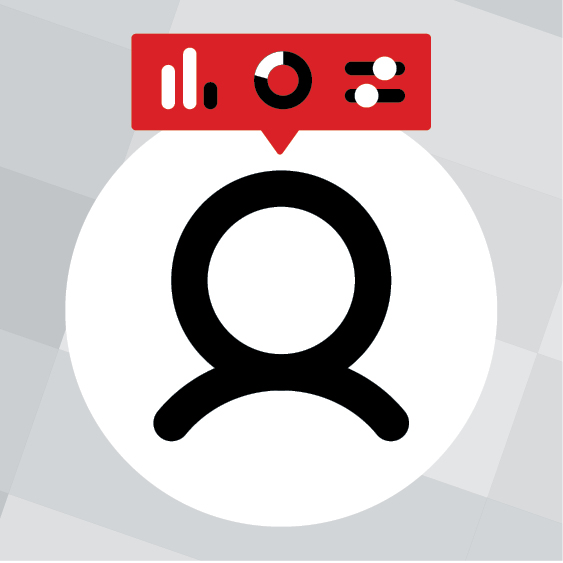If this is the first time you’ve heard the term, you might be wondering, “What is candidate experience?” Simply put, it’s the way a job seeker perceives an organization throughout the entire hiring process. The candidate experience begins when the candidate learns of a company’s job opening, then it continues through the application process, the personality assessment process, the interview(s), decision-making, the job offer or rejection, and even onboarding. In other words, every nuance of the hiring process contributes to candidate experience.
Candidate experience has become increasingly important to companies seeking to hire because it’s a critical component of organizational reputation and a factor in attracting top talent. With the goal of creating an experience that leaves every candidate with a positive impression, companies have begun to audit hiring processes from application to onboarding. To help companies build a better candidate experience, Hogan surveyed more than 2,000 current and recent job seekers around the globe to find out what they think companies should (or shouldn’t) do to leave a positive impression.
So what should you take into account to craft the perfect candidate experience? Seven key themes emerged from our data.
1) How the hiring process shapes candidates’ view of a company
The first step in this research project was to examine our hypothesis that the hiring process affects a job seeker’s view of a company. Confirming the hypothesis, most job seekers said the hiring process can somewhat affect their view of a company. In fact, only 6.56% of job seekers said the hiring process does not affect their view of a company — meaning every company needs to take candidate experience seriously.
To what extent does the hiring process affect your view of a company?
This is especially true for executive-level hiring. Almost 41% of executives reported that the hiring process has an extreme effect on how they perceive companies seeking to hire.
Executives: To what extent does the hiring process affect your view of a company?
When asked which part of the hiring process makes them most likely to have a positive view of a company, job seekers located everywhere but China — where personality assessments and cognitive tests were preferred — overwhelmingly indicated interviews are a company’s best shot at creating a positive impact.
Which part of the hiring process makes you most likely to have a positive view of the company?
Job seekers also said that interviews are their preferred method of being evaluated. However, while job seekers said they generally preferred interviews to other methods and felt interviews offer the best and fairest representation of candidates, interviews lost to personality assessments when we asked which method is more enjoyable. We’ll explore the concept of an enjoyable versus fair experience later in the article.
Although job seekers prefer interviews to other evaluation methods, it’s critical for companies to remember that interviewing is a two-way street, especially when the job market is in favor of the job seeker. The interview is the one part of the hiring process when candidates are able to ask questions to find out if the job will be a good fit for them. Hiring managers should be prepared to be evaluated by candidates on a range of subjects. Some questions candidates might ask include the following: “What do you like about working here?”, “What challenges are your organization and industry currently facing?”, and “How do you see the organization’s values manifest in your day-to-day role?”
“Interviewing is like dating,” said Hogan Consultant Jessie McClure, noting that the interview provides an opportunity for candidates to connect with the organization, hiring manager, and future team members. “Job seekers look for organizations that share their values and will help them grow. In many cases, when a job seeker leaves an interview, they can likely tell if there was a ‘spark’ or not, which will certainly impact their desire (or lack thereof) to work there.”

Which type of assessment or assessment method is more enjoyable?
When asked which part of the hiring process most negatively affects their view of a company, two factors were nearly tied: offers and rejections came in first, followed by responsiveness to applications. Responses from different countries fluctuated slightly, but the overall message was clear — job seekers want to be treated with respect above all else.
Which part of the hiring process most negatively affects your view of a company?
From a practical standpoint, it’s not just candidates who benefit from organizational responsiveness. There’s something in it for companies too. Being able to balance making good decisions with a fast response time is key to not only crafting a high-quality candidate experience, but also finding the right people for the roles you need to fill.
“Those with more efficient hiring processes are more likely to end up with the best hires, simply because they are moving quickly compared to the other organizations a candidate may be waiting to hear from,” said McClure.

2) When to assess candidates
As an assessment company, we wanted to find out when job seekers preferred to be assessed and how much time they are willing to spend taking personality assessments for hiring purposes.
We found that preferences for assessment timing depend on job level. Overall, most entry-level, midlevel (nonmanager), and manager job seekers said they would prefer to take an assessment after having their applications reviewed by the company. Directors and executives had a different take on the matter. Directors prefer to be assessed before their applications are reviewed, and executives prefer to be assessed immediately after submitting an application.
When in the application process would you prefer to take an assessment?
Directors and executives: When in the application process would you prefer to take an assessment?
Overwhelmingly, however, candidates want to complete assessments before being contacted for an interview, regardless of their job level.

“My hypothesis is that, once people have interviewed, they prefer for the organization to use the interview to inform the hiring decision because they feel interviews allow them to best represent themselves,” said Brandon Ferrell, Hogan’s director of product innovation.
3) Long assessments don’t scare candidates
The time commitment required to complete assessments is an important component of the candidate experience, as well. The mean time job seekers said they would spend taking an assessment is 42 minutes. This is good news — Hogan’s core personality assessments take about 15 minutes each to complete.
When asked if they would stop the application process if the assessment took more than 45 minutes, 60% of respondents disagreed or strongly disagreed. Interestingly, recent research has suggested that attrition during assessments is beneficial because people who abandon the application tend to be poor-quality candidates otherwise.
To what extent do you agree with the following statement?: “I would stop the application process if a company asked me to take a 45-minute assessment.”
4) Job applicants want the hiring process to be fair
In recent years, many companies have been concerned about making the hiring process both fun and fast to keep job candidates engaged. But is this necessary? What do job seekers value the most in the candidate experience? We asked, and across the board, job seekers want the hiring process to be fair and identify the most qualified candidate. These two factors were ranked well above the process being fun or fast. These survey results indicate that candidates’ goals are actually quite aligned with most organizational goals around selection: to find qualified talent in a fair way.
As a job applicant, which of these factors is most important to you?
“Because of misconceptions about what candidates want, we’ve seen clients explore new tools that seem exciting and quick to complete but are often less accurate at finding the best talent in a fair way,” said Kimberly Nei, Hogan’s director of talent analytics. “These results show that companies can invest more into valid and reliable assessments without being overly concerned that a longer assessment will generate more negative applicant reactions. Companies should prioritize investing in ensuring their selection methods are valid, rather than finding a faster or more fun way to assess applicants.”

5) How candidates view different assessment methods
We asked the job seekers we surveyed to compare personality assessments, cognitive tests, and interviews pairwise. As mentioned previously, the results indicated that candidates tend to favor interviews, but they perceive personality assessments and cognitive tests as being more enjoyable. Personality and cognitive tools were viewed mostly equally, with personality assessment maintaining a slight edge in three of the four comparisons.
Personality assessments vs. cognitive tests
Personality assessments vs. interviews
Interviews vs. cognitive tests
Interviews have long been used in hiring because they have strong face validity, which means they are perceived as being fair and accurate. People think they know exactly what is being evaluated in an interview, which allows them to believe they are “putting their best foot forward.” In contrast, they might not always understand what items on personality assessments are measuring (e.g., ‘I like being the center of attention’). However, this is problematic.

“It is well documented that interviews, especially if they aren’t highly structured and well designed, are likely the least accurate in finding the best candidate and are often subject to the biases of the interviewer, resulting in unfair hiring decisions,” said Nei.
But interviews aren’t going to disappear any time soon, and these survey results suggest candidates want interviews to be included in the selection process. Nei’s recommendation for the best candidate experience? “Use interviews and personality assessments, as we know candidates find assessments to be more enjoyable, and they can help organizations ensure the hiring process is fair and accurate.”
6) Directors and up prefer cognitive assessments
Many employers fear that an executive candidate might be offended if asked to complete a cognitive test. But the data show that this is unlikely. Our pairwise comparisons revealed an interesting trend: the higher up the corporate ladder, the stronger the preference for cognitive tests. This trend was very pronounced and actually increased in steady increments as job seekers’ corporate status increased.
Personality assessments vs. cognitive tests, by job level
The reason for this trend is, perhaps, twofold. First, executives tend to be more educated than entry-level employees and are thus more likely to be confident in their cognitive abilities. Second, as the data show, personality assessments are perceived as less fair than cognitive tests. It’s possible that this perception of the fairness of personality assessments versus cognitive tests is simply a matter of familiarity — that is, cognitive tests are more easily understood by laypeople.
Hogan Consultant Kirsten Mosier puts it this way: “Job seekers are accustomed to completing standardized tests for higher education and other life milestones, so cognitive ability tests seem like a normal hurdle. When most people think of a personality assessment, on the other hand, they think of something like the MBTI [Myers-Briggs Type Indicator], whereas reputable, science-based personality assessments like Hogan’s are not as well known.”

7) Gamified assessments seem fun, but not fair
Gamification has been one of the fastest-growing trends in the assessment industry over the past few years. Designed to be less stressful and tedious than traditional assessments and therefore more enjoyable to job seekers, gamified assessments feature a series of games instead of a question-and-answer format. But job seekers, especially older job seekers, don’t perceive them as fair or accurate. Moreover, many game-based assessments aren’t all they might claim to be.
Traditional assessments vs. game-based assessments

“Assessments that claim to be game-based often aren’t games at all,” said Hogan Chief Science Officer Ryne Sherman. “In fact, most are just boring psychology laboratory tasks, such as Go, No-Go. Dr. Richard Landers, a global expert on game-based assessments, points out that dressing up boring tasks and adding arbitrary point systems doesn’t make something a game.”
These data tell us that, despite the attractive appeal of gamification for improving user experience, real job applicants want to be evaluated seriously, fairly, and accurately. Because candidates strongly prefer a fair hiring process to a fun hiring process, companies hoping to build a high-quality candidate experience should consider their assessment options carefully.
Want to learn more?
In this webinar, now-former Hogan CEO Scott Gregory, PhD, and Chief Science Officer Ryne Sherman, PhD, discuss results from our recent global candidate survey. You’ll find out which parts of the hiring process most positively and negatively impact candidates’ view of a company, their preferences for types of assessments, what they find enjoyable, what they find fair, and how these results differ across demographics and locales.
